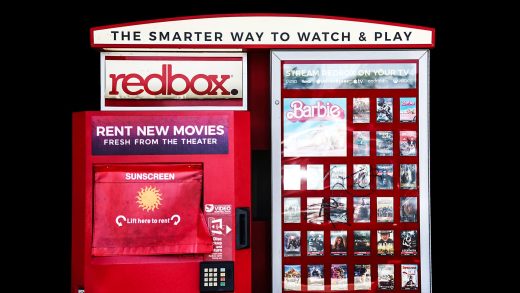Redbox is dead. Here’s what that means for employees, customers, and kiosks
Redbox is dead. Here’s what that means for employees, customers, and kiosks
Movie rental service Redbox is finally closing after its parent company announced that assets will be liquidated in Chapter 7 bankruptcy. Here’s what to know.
BY Chris Morris
Redbox, those familiar kiosks that dispense DVDs and Blu-Rays at Walmart and convenience and grocery stores around the country, has finally succumbed to the digital revolution with Redbox closing.
Chicken Soup for the Soul Entertainment, which owned the rental business, has adjusted its bankruptcy filing from Chapter 11 to Chapter 7, meaning that instead of trying to reorganize its debt, the company will instead liquidate its holdings.
The news is both surprising, given the preponderance of Redbox kiosks across the country, and expected, given the film industry’s embrace of direct-to-consumer streaming. (Even the site’s X/formerly Twitter account, which has “we still exist. thanks for asking” in its bio, hinted of dire times ahead over the past couple of weeks.)
For customers, though, it can be confusing. While there aren’t yet answers to every question, here’s a guide to help you understand what’s going on.
Why is Redbox closing?
Redbox’s parent company, Chicken Soup for the Soul, has been in trouble for a while, with over $1 billion in debt. The company filed for bankruptcy on June 29 and secured a “debtor in possession” loan of $8 million to help it pay its workers (who had gone almost a month without a paycheck and benefits). No additional money is coming, which led to the shift from Chapter 11 to Chapter 7.
From a broader perspective, though, this might have been inevitable. Consumers have been shifting away from DVDs/BluRays and toward streaming since before the pandemic. That trend only accelerated as people were forced to stay home. Services like Max, Disney+, and Netflix offer deep catalogs of older films, and many films arrive on pay-per-view within weeks of debuting in theaters. It’s also increasingly rare to find a DVD or Blu-Ray player in peoples’ living rooms.
How many employees are being affected?
All 1,000 workers at Redbox are expected to be laid off. It’s not yet known whether they’ll be eligible to file claims for back pay or severance. U.S. Bankruptcy Judge Thomas M. Horan, in approving the Chapter 7 filing, made it clear that “in no circumstance shall this order be deemed to require any employee of the debtors to provide any services without assurance of payment.”
Redbox did not reply to Fast Company’s request for comment about the proceedings.
When will the kiosks shut down?
Some already have. As far back as March, there have been reports that some kiosks were found unplugged, with their credit card readers taped over. As for the rest (which number 24,000), that’s still up in the air. The company’s bankruptcy trustee will determine the next steps.
“I rented a movie from Redbox recently. Do I still have to return it?”
Technically, yes. While Redbox is closing, many of the kiosks are still operational, and you could run the risk of getting hit with a late fee.
“Can I still watch Redbox on demand?”
No. The company’s website has already been largely deactivated. While it’s still online, you can’t use it to locate a kiosk near you anymore, and any attempt to view films on demand or even see what movies are at kiosks results in this message: “Oops. Something unexpected happened.” The company’s FAST (free TV) offerings are offline as well. Ironically, you can still sign up for a Redbox account on the site, however.
What other brands does Chicken Soup for the Soul own?
Redbox was the company’s biggest purchase—a $375 million deal in 2022. And, ultimately, that was likely what caused the collapse of Chicken Soup. Among the company’s other holdings are the streaming services Crackle, FrightPix, and Popcornflix as well as film distributor Screen Media.
What will happen to those?
Some divisions, like Pivotshare, were closed before the bankruptcy filing. The Popcornflix website is inaccessible these days, but others, including Crackle and FrightPix, are still accessible and showing films. Screen Media (which distributed such films as Blue Iguana and The Man Who Killed Don Quixote) has at least two films in some stage of production, but many of those holdings will likely be sold to other companies.
Is it possible someone will buy Redbox and keep it alive?
Anything’s possible, but it’s unlikely, at least in anything resembling its current form. The purchase of Redbox likely sunk Chicken Soup for the Soul—and there’s no surge in demand for physical media expected anytime soon.
Of course, there are some companies that once seemed doomed to liquidation and made it back: Most notably Toys “R” Us and Bed, Bath & Beyond. Neither, though, is anything close to the powerhouse it was in its prime.
ABOUT THE AUTHOR
(27)



